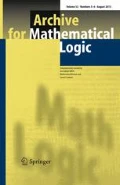Abstract
In our former works, for a given concept of reduction, we study the following hypothesis: “For a random oracle A, with probability one, the degree of the one-query tautologies with respect to A is strictly higher than the degree of A.” In our former works (Suzuki in Kobe J. Math. 15, 91–102, 1998; in Inf. Comput. 176, 66–87, 2002; in Arch. Math. Logic 44, 751–762), the following three results are shown: The hypothesis for p-T (polynomial-time Turing) reduction is equivalent to the assertion that the probabilistic complexity class R is not equal to NP; The hypothesis for p-tt (polynomial-time truth-table) reduction implies that P is not NP; The hypothesis holds for each of the following: disjunctive reduction, conjunctive reduction, and p-btt (polynomial-time bounded-truth-table) reduction. In this paper, we show the following three results: (1) Let c be a positive real number. We consider a concept of truth-table reduction whose norm is at most c times size of input, where for a relativized propositional formula F, the size of F denotes the total number of occurrences of propositional variables, constants and propositional connectives. Then, our main result is that the hypothesis holds for such tt-reduction, provided that c is small enough. How small c can we take so that the above holds? It depends on our syntactic convention on one-query tautologies. In our setting, the statement holds for all c < 1. (2) The hypothesis holds for monotone truth-table reduction (also called positive reduction). (3) Dowd (in Inf. Comput. 96, 65–76, 1992) shows a polynomial upper bound for the minimum sizes of forcing conditions associated with a random oracle. We apply the above result (1), and get a linear lower bound for the sizes.
Similar content being viewed by others
References
Allender E., Buhrman H., Koucký M.: What can be effectively reduced to the Kolmogorov-random strings?. Ann. Pure Appl. Logic 138, 2–19 (2006)
Ambos-Spies K.: Randomness, relativizations, and polynomial reducibilities. In: Selman, A.L. (eds) Structure in Complexity Theory. Lecture Notes in Computer Sciences, vol. 223, pp. 23–34. Springer, Berlin (1986)
Ambos-Spies K., Fleischhack H., Huwig H.: Diagonalizations over polynomial time computable sets. Theor. Comput. Sci. 51, 177–204 (1987)
Ambos-Spies K., Mayordomo E.: Resource-bounded measure and randomness. In: Sorbi, A. (eds) Complexity, Logic, and Recursion Theory. Lecture Notes in Pure and Applied Mathematics, vol. 187, pp. 1–47. Marcel Dekker, New York (1997)
Ambos-Spies K., Neis H., Terwijin S.A.: Genericity and measure for exponential time. Theor. Comput. Sci. 168, 3–19 (1996)
Balcázar J.L., Díaz J., Gabarró J.: Structural Complexity I. Springer, Berlin (1988)
Bennett C.H., Gill J.: Relative to a random oracle A, PA ≠ NPA ≠ co NPA with probability 1. SIAM J. Comput. 10, 96–113 (1981)
Dowd M.: Generic oracles, uniform machines, and codes. Inf. Comput. 96, 65–76 (1992)
Downey R., Hirschfeldt D.R., Nies A., Terwijn S.A.: Calibrating randomness. Bull. Symb. Log. 12, 411–491 (2006)
Jockusch, C.G.: Reducibilities in recursive function theory, Ph.D. thesis, MIT Press, Cambridge (1966)
Ko K.-I.: Some observations on the probabilistic algorithms and NP-hard problems. Inform. Process. Lett. 14, 39–43 (1982)
Kumabe, M., Suzuki, T., Yamazaki, T.: Logarithmic truth-table reductions and minimum sizes of forcing conditions (preliminary draft). In: Proof Theory and Computation Theory, Kyoto, 2005, Sūrikaisekikenkyusho Kōkyuroku, no. 1442, pp. 42–47 (2005)
Kumabe, M., Suzuki, T., Yamazaki, T., Kumabe, M., Suzuki, T., Yamazaki, T.: Truth-table reductions and minimum sizes of forcing conditions (preliminary draft). In: Sūrikaisekikenkyusho Kōkyuroku, no. 1533, pp. 9–14 (2007)
Ladner R.E., Lynch N.A., Selman A.L.: A comparison of polynomial time reducibilities. Theor. Comput. Sci. 1, 103–123 (1975)
Post E.L.: Recursively enumerable sets of positive integers and their decision problems. Bull. Am. Math. Soc. 50, 284–316 (1944)
Rogers, H. Jr.: Theory of recursive functions and effective computability. Massachusetts Institute of Technology (1987) (Original edition: MacGraw-Hill, New York, 1967)
Sacks G.E.: Degrees of Unsolvability, Annals of Mathematics Studies, vol. 55. Princeton university press, Princeton (1963)
Suzuki T.: Recognizing tautology by a deterministic algorithm whose while-loop’s execution time is bounded by forcing. Kobe J. Math. 15, 91–102 (1998)
Suzuki, T.: Computational complexity of Boolean formulas with query symbols. Doctoral dissertation, Institute of Mathematics, University of Tsukuba, Tsukuba-City, Japan (1999)
Suzuki T.: Complexity of the r-query tautologies in the presence of a generic oracle. Notre Dame J. Formal Logic 41, 142–151 (2000)
Suzuki T.: Forcing complexity: minimum sizes of forcing conditions. Notre Dame J. Formal Logic 42, 117–120 (2001)
Suzuki T.: Degrees of Dowd-type generic oracles. Inf. Comput. 176, 66–87 (2002)
Suzuki T.: Bounded truth table does not reduce the one-query tautologies to a random oracle. Arch. Math. Logic 44, 751–762 (2005)
Tang S., Book R.V.: Polynomial-time reducibilities and “almost all” oracle sets. Theor. Comput. Sci. 81, 35–47 (1991)
Author information
Authors and Affiliations
Corresponding author
Additional information
The authors are partially supported by Grant-in-Aid for Scientific Research (No. 14740082 and No. 17540131), Japan Society for the Promotion of Science.
Rights and permissions
About this article
Cite this article
Kumabe, M., Suzuki, T. & Yamazaki, T. Does truth-table of linear norm reduce the one-query tautologies to a random oracle?. Arch. Math. Logic 47, 159–180 (2008). https://doi.org/10.1007/s00153-008-0076-4
Received:
Revised:
Published:
Issue Date:
DOI: https://doi.org/10.1007/s00153-008-0076-4
Keywords
- Truth-table reduction
- Computational complexity
- Random oracle
- Monotone Boolean formula
- Forcing complexity



